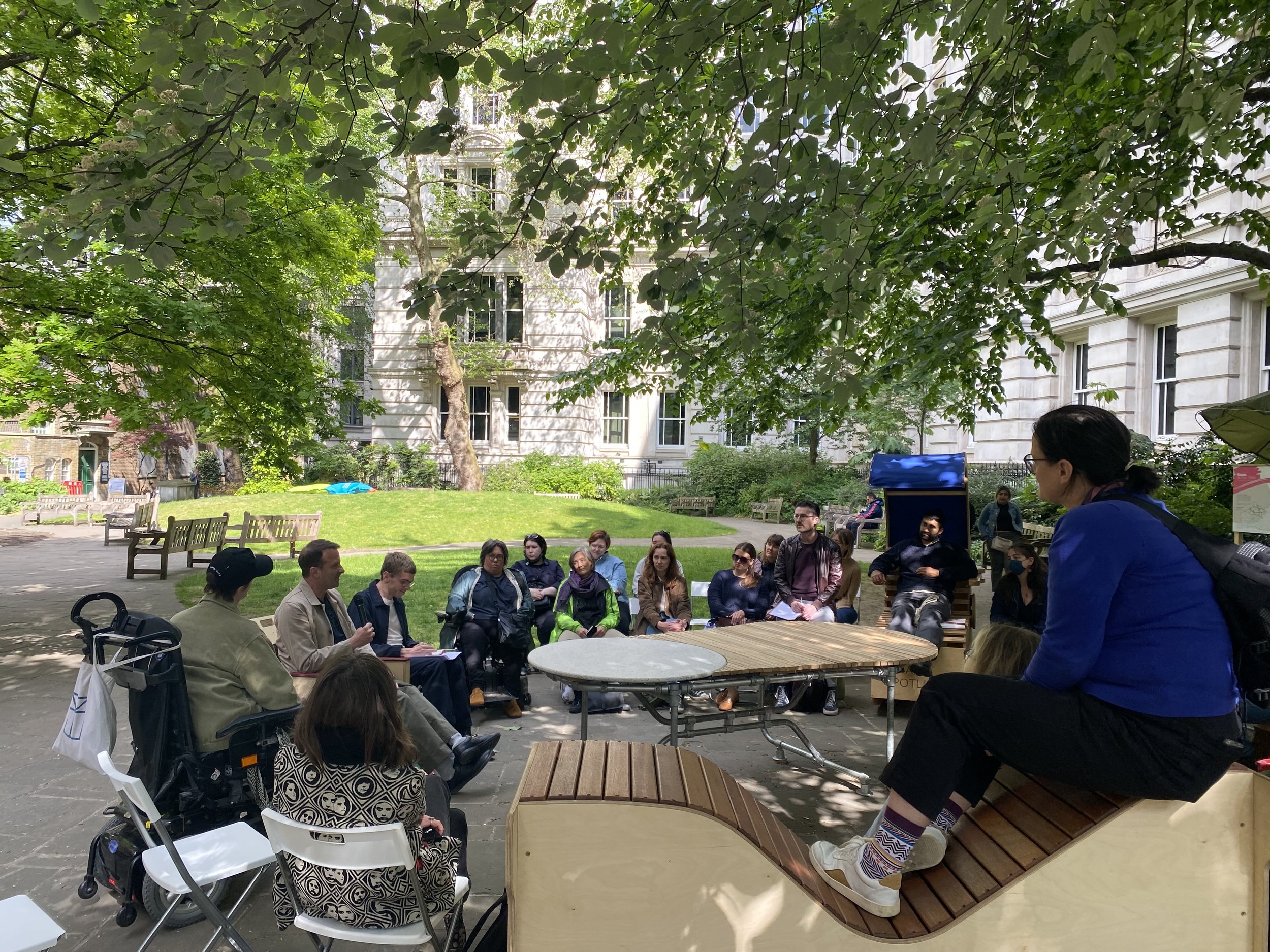Seats at the Table
Type: Intervention
Year: 2023
Location: London
DisOrdinary Architecture contributors: Jos Boys and Poppy Levison
ReFabricate contributors: Guiseppe Ferrigno and Rosie Scott
Competition lead: London Festival of Architecture (LFA)
Funding: Foundation for Future London, Culture Mile and the City of London Corporation
‘Seats at the Table’ was competition-winning scheme undertaken in collaboration with ReFabricate, and consisted of a series of temporary, accessible and sustainable installations in a Postman’s Park, part of the Smithfield area of the City of London. The aim of the project was to challenge conventional public realm design by exploring how alternative ways of working and re-use of materials could create truly accessible places.
‘Seats at the Table’ was in response to a ‘Co-Designing Equity in the Public Realm’ competition for the London Festival of Architecture during June 2023, funded by the Foundation for Future London, Culture Mile and the City of London Corporation.
Our programme consisted of six workstreams:
Seat Co-design: This saw the delivery of a series of workshops with both non-disabled and disabled school children to design ‘seats at the table’. The workshops took an explorative design approach to creating playful chair designs, focused on embracing and highlighting various access needs, as a way to express difference and diversity creatively.
Site Co-explorations: These were two workshops that enabled collaborations between disabled artists and built environment professionals to choose the most accessible site from three locations near the Smithfield area in the City of London, as well as to highlight what other creative access improvements might need to be made.
Events Programme: The installations played host to a series of workshops on sustainability and accessible inclusion throughout the 2023 edition of the London Festival of Architecture. These included workshops around sustainability with ReFabricate, an in conversation with David Gissen and Jordan Whitewood-Neal and James Zatka-Haas of Dis Collective, and launch party for the project.
The Build: Alongside The Bartlett School of Architecture’s B-made workshop team at UCL, the student designs were collated into six bespoke chairs. The Remakery, a co-operative workshop, designed and built the central table. We aimed to use as much waste, recycled or reclaimed materials as possible, including reclaimed timber from London Reclamation & Salvage, timber from fallen trees from Fallen and Felled, and recycled plastic from Smile Plastics.
Installation: The Seats at the Table - and connected exhibition explaining the programme - was installed in Postman’s Park alongside a series of accessible site interventions by disabled artists, funded separately by Arts Council England for a parallel DisOrdinary Architecture project called Making Truly Accessible Spaces.
Disassembly and Reuse: Each participating school homed their corresponding chair either permanently or temporarily, and remaining materials found second homes with local community and school groups within London.
Gallery
Legacy
Accessibility was a thread running throughout the programme to ensure an inclusive environment both digitally and physically, and to provide open and safe opportunities to discuss how different and diverse accessible needs can be met creatively.
To expand the legacy of the project, the DisOrdinary Architecture team led two further projects building on the Seats at the Table intervention:
1 - Making Truly Accessible Spaces: A series of interventions centred around the creativity of disabled artists in enabling truly accessible practices for public venues and events and worked to expand knowledge around how you can provide good accessibility to artists and audiences and increased accessibility to sites, through a series of additional design interventions.
2 - Many more parts than M!: A compendium exploring how to engage with built environment accessibility in ways that take us beyond conventional checklists, templates, design guidance and legal regulations, through a prototype compendium for built environment professionals, students and anyone interested in conversations around Disability and spatial justice.
Both were supported by Arts Council England (ACE) funding.











